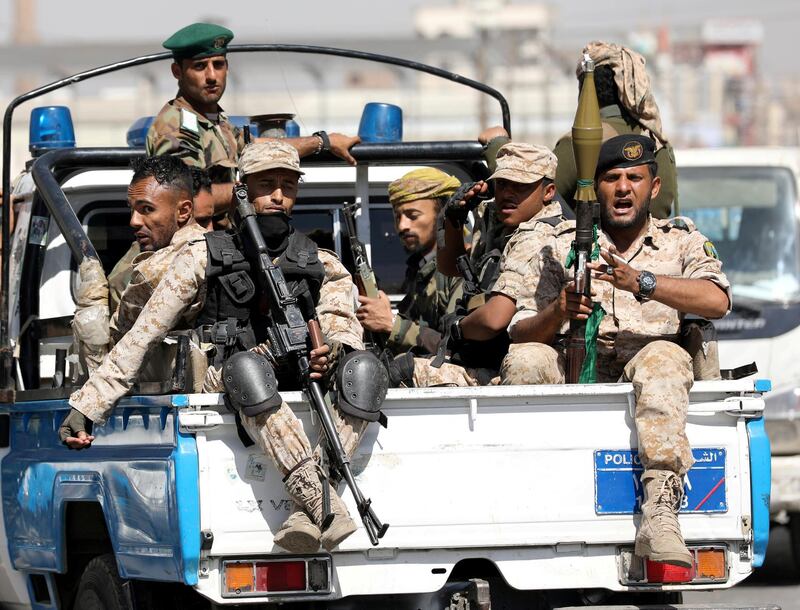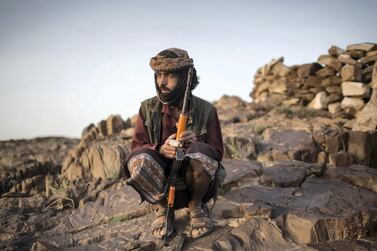The Saudi-led coalition’s announcement of a ceasefire in Yemen gives the warring sides an opportunity for peace but depends on whether the Houthis join in, officials said on Thursday.
Officials in Riyadh said it was intended to help Yemen fight off the coronavirus pandemic, although the country has yet to report any cases.
The unilateral truce is for two weeks but Saudi officials said it could be extended.
UN Secretary General Antonio Guterres welcomed the news.
“This can help to advance efforts towards peace as well as the country’s response to the Covid-19 pandemic," Mr Guterres said.
He called on the government and the Houthis to commit to an immediate cessation of hostilities.
But the Yemeni government said it was sceptical of the Houthis’ commitment to the ceasefire, especially after they attacked several cities on Wednesday night.
"We have proven to the world our dedication for finding peace yet the Houthis respond by using violence," Yemen's Minister of Human Rights, Mohammed Askar, told The National.
“The international community must exert the required pressure to force the Houthis to commit to peace and to give priority to the Yemeni people."
The announcement is the first major breakthrough since UN-mediated talks in late 2018 in Sweden, where both sides signed a ceasefire for the port city of Hodeidah.
The Saudi-led truce is a step in the right direction and will be a test of the rebels' intentions, Hooria Mashhour, a former Yemeni human rights minister, told The National.
“It lays a foundation for setting some seriousness in ending the war and returning peace to the region,” Ms Mashhour said.
Elana DeLozier, a research fellow at the Washington Institute for Near East Policy, said: "Whether the ceasefire can hold beyond the two weeks will depend on how the Houthis react. Their political will is the critical factor.
“If the ceasefire can become a mutual one, that will create the foundation for the UN to set up comprehensive peace talks."
Ms Mashhour said an outbreak of the coronavirus would be catastrophic for Yemen.
“We thought that the Houthis would be more aware of the seriousness and challenges the disease is posing to the world,” she said.
It is important that the Houthis intend to stick to the agreement, said Afrah Nasser, a Yemen researcher for Human Rights Watch.
“This development should not be just about ending the fighting between the Houthis and the coalition, it should focus on stopping the violence internally in Yemen,” Ms Nasser said.
“I hope the Houthis will have a vision to stop the violence against civilians in areas such as Taez, Hodeidah and Marib.”
The UN special envoy to Yemen, Martin Griffiths, expressed his appreciation to Saudi Arabia and the coalition for “acting on this critical moment for Yemen”.
“The parties must now use this opportunity and cease immediately all hostilities with the utmost urgency, and make progress towards comprehensive and sustainable peace,” Mr Griffiths said.
He said he hoped and expected that the coalition’s ceasefire announcement would create an environment for the parties to conclude agreements already made “in the very near future”.
Saudi deputy defence minister Prince Khalid bin Salman called on the rebels to take part in serious talks.
“The two-week ceasefire will hopefully create a more effective climate to de-escalate tensions and work with [Mr Griffiths] towards a sustainable political settlement,” Prince Khalid tweeted.
Officials in Saudi Arabia said they invited government and Houthi representatives to peace talks in the kingdom this month.
The Saudi-led military Coalition has supported the internationally recognised government since 2015, when the Iran-backed rebels overran the capital Sanaa.
Prince Khalid also announced more than $500 million (Dh1.83bn) in aid for the UN humanitarian response plan for Yemen in 2020, and $25m to help fight the spread of the coronavirus.
The truce would create "favourable conditions" for a UN-supervised meeting between the Yemeni government, the rebels and the coalition, said Col Turki Al Malki, spokesman for the Saudi-led forces.
The UN and western allies have said a truce was urgent amid the threat of the coronavirus, with the Yemeni war leaving millions vulnerable to disease.
“The coalition is determined to create a conducive environment for the UN envoy’s efforts, and to alleviate the suffering of the brotherly people of Yemen and support the efforts towards combating the spread of Covid-19 pandemic," Col Al Malki said.
Dr Anwar Gargash, the UAE Minister of State for Foreign Affairs, praised the ceasefire decision.
Coalition ceasefire product of Saudi effort & leadership in unprecedented crisis - hope the Houthis rise to the occasion. The COVID-19 crisis eclipses everything - the international community must step up efforts & work together to protect the Yemeni people.
— د. أنور قرقاش (@AnwarGargash) April 9, 2020
“It is an important decision, that should be built upon politically and on the humanitarian side," Dr Gargash said on Twitter.
"The coalition’s decision, led by the sisterly Kingdom of Saudi Arabia, to a ceasefire in Yemen for a period of two weeks is a wise and responsible decision.
"It is an important decision that must be built on humanly and politically."
Sir John Lorimer, the UK's senior defence adviser to the Middle East, tweeted that the Saudi decision was a "courageous move".







